Energy Consumption
Ground Source Heat Pumps: Revolutionizing Energy Efficiency

Fed up with energy bills that just seem to go up and up, along with heating and cooling systems that can’t keep up in an eco-friendly way? Your search ends here! Ground Source Heat Pumps (GSHPs) are set to transform how we think about energy efficiency. Utilizing the natural warmth of the Earth, GSHPs offer a solution that’s not only sustainable but also friendly to your wallet.
In this article, we will explore how GSHPs work, their numerous benefits, and why they are more efficient than traditional systems. Join us on this journey to discover the future of energy efficiency and how GSHPs can serve you.
Key Takeaways
- Ground Source Heat Pumps (GSHPs) utilize underground heat exchange to provide heating and cooling, reducing reliance on traditional methods.
- GSHPs significantly reduce energy consumption and greenhouse gas emissions, making them a sustainable and renewable energy source.
- GSHPs achieve higher performance and energy efficiencies, resulting in long-term savings potential due to reduced energy consumption and lower maintenance costs.
- Despite higher installation costs, GSHPs provide a cost-effective heating solution with significant savings on utility bills and increased market value for buildings.
How Do Ground Source Heat Pumps Work
As we explore the topic of how ground source heat pumps work, let’s begin by understanding the basic principles behind this innovative technology.
Ground source heat pumps utilize the principle of underground heat exchange to provide heating and cooling in a highly efficient manner. These systems harness the natural heat stored in the earth’s crust, which remains at a relatively constant temperature throughout the year.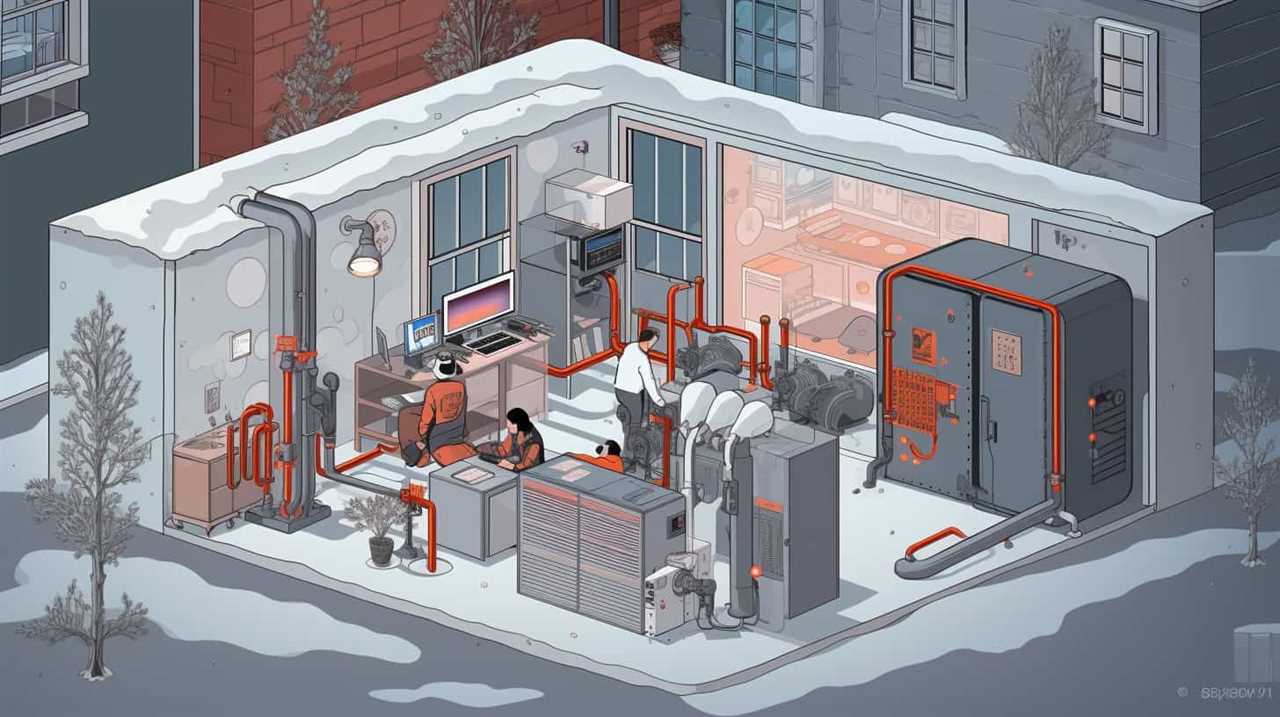
By circulating a fluid through a network of underground pipes, the heat is absorbed from the ground during the colder months and transferred to the building for heating purposes. Conversely, during the warmer months, the heat is extracted from the building and transferred back into the ground, effectively providing cooling.
This process not only reduces reliance on traditional heating and cooling methods but also makes ground source heat pumps a sustainable and renewable energy source.
The Benefits of Ground Source Heat Pumps
Ground source heat pumps offer a range of benefits that make them a highly desirable heating solution.
Firstly, they significantly reduce energy consumption by efficiently transferring heat from the ground to the building, resulting in lower electricity usage and greenhouse gas emissions.
Additionally, ground source heat pumps are a cost-effective choice in the long run, as they have lower operating and maintenance costs compared to traditional heating systems.
Lower Energy Consumption
We can significantly reduce our energy consumption by using ground source heat pumps. These innovative systems offer sustainable heating solutions that not only benefit the environment but also save homeowners money in the long run.
Ground source heat pumps work by utilizing the constant temperature of the earth to heat and cool buildings. By extracting heat from the ground during the winter and transferring it indoors, these systems reduce the need for traditional heating methods, such as fossil fuels. This results in a substantial decrease in carbon emissions, making ground source heat pumps an environmentally friendly choice.
Additionally, these systems operate at high energy efficiencies, meaning they require less electricity to produce the same amount of heat compared to other heating systems.
Cost-Effective Heating Solution
Our ground source heat pumps provide a cost-effective and efficient heating solution, allowing us to save money on our energy bills while still enjoying a comfortable home. The cost-effective installation of ground source heat pumps is due to their high efficiency and long-term savings potential.
The initial investment may be higher compared to traditional heating systems, but the long-term savings make up for it. Studies have shown that ground source heat pumps can reduce heating costs by up to 70%. Additionally, these systems have a longer lifespan compared to other heating systems, resulting in lower maintenance and replacement costs over time.
The combination of reduced energy consumption and lower maintenance costs makes ground source heat pumps a cost-effective choice for homeowners looking to save money on their heating bills in the long run.
Why Ground Source Heat Pumps Are More Efficient
One of the main reasons ground source heat pumps are more efficient is because of their ability to transfer heat from the ground to our homes. Unlike other heating systems that rely on burning fuel to generate heat, ground source heat pumps use geothermal energy, which is a renewable and sustainable source of energy. This allows them to achieve higher performance and reduce energy consumption.
Ground source heat pumps work by extracting heat from the earth through a series of underground pipes filled with a refrigerant. The ground acts as a heat source in winter and a heat sink in summer. The extracted heat is then transferred to our homes using a compressor and a heat exchanger. This efficient transfer of heat results in significant energy savings and lower utility bills for homeowners.
Additionally, ground source heat pumps have a longer lifespan compared to conventional heating systems, reducing the need for frequent replacements and contributing to their overall efficiency. With their ability to harness geothermal energy and high-performance capabilities, ground source heat pumps are indeed revolutionizing energy efficiency.
Harnessing the Earth’s Natural Heat With GSHPs
Ground source heat pumps harness the earth’s natural heat by utilizing underground pipes filled with a refrigerant, thus providing an efficient and sustainable source of energy. This renewable heating technology takes advantage of the earth’s thermal energy, offering numerous benefits for both residential and commercial buildings.
Imagine a system that taps into the constant temperature of the earth, regardless of the weather outside. This allows for consistent and reliable heat distribution throughout the year, ensuring optimal comfort and energy efficiency.
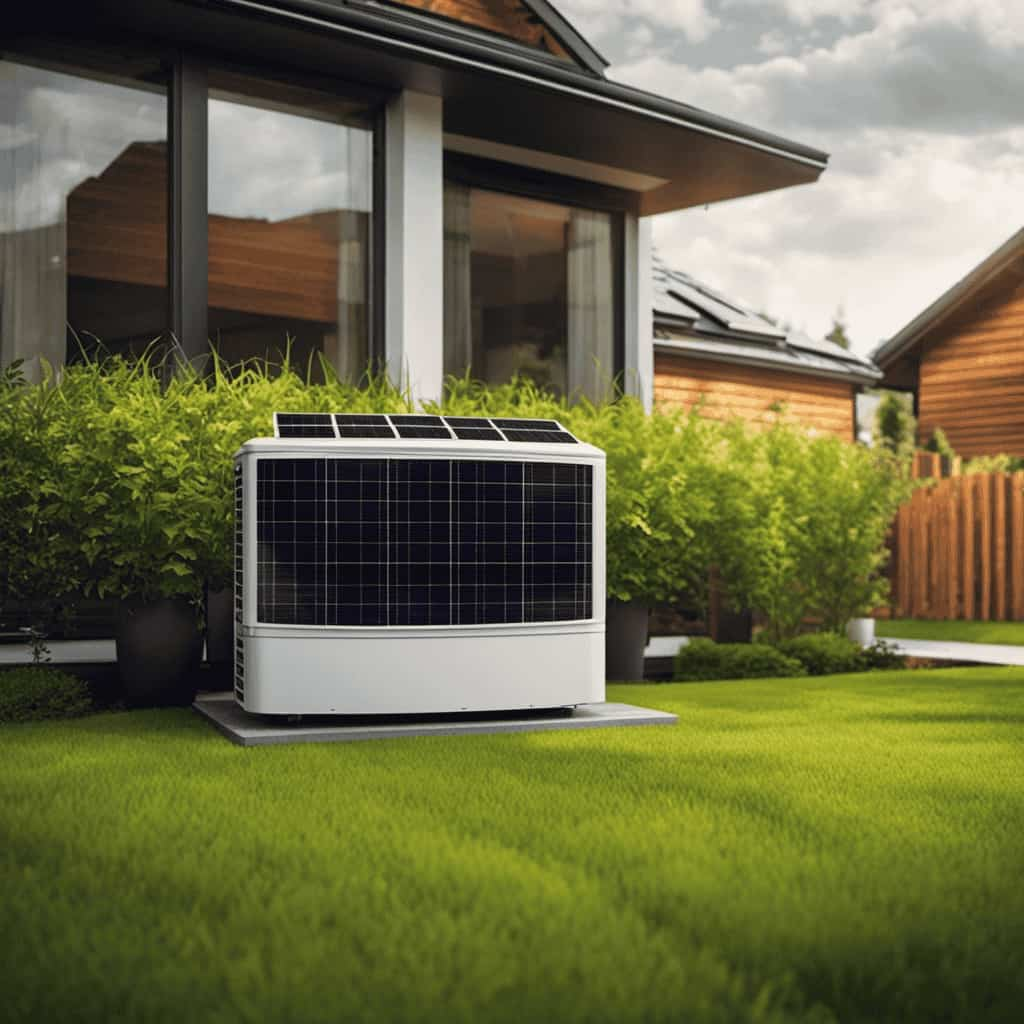
With ground source heat pumps, heat is extracted from the earth and transferred to the building during the colder months. Conversely, during warmer months, heat is extracted from the building and released into the ground. This process significantly reduces the need for traditional heating and cooling methods, resulting in lower energy consumption and reduced carbon emissions.
Transitioning to the subsequent section about the environmental impact of ground source heat pumps, it’s important to understand the positive contribution this technology has on our planet.
The Environmental Impact of Ground Source Heat Pumps
We can clearly see the positive environmental impact of ground source heat pumps in reducing energy consumption and carbon emissions.
Ground source heat pumps, also known as geothermal heat pumps, utilize renewable energy from the earth to provide heating and cooling for buildings. By extracting heat from the ground during the winter and transferring heat back into the ground during the summer, these systems significantly reduce the need for traditional fossil fuel-based heating and cooling methods.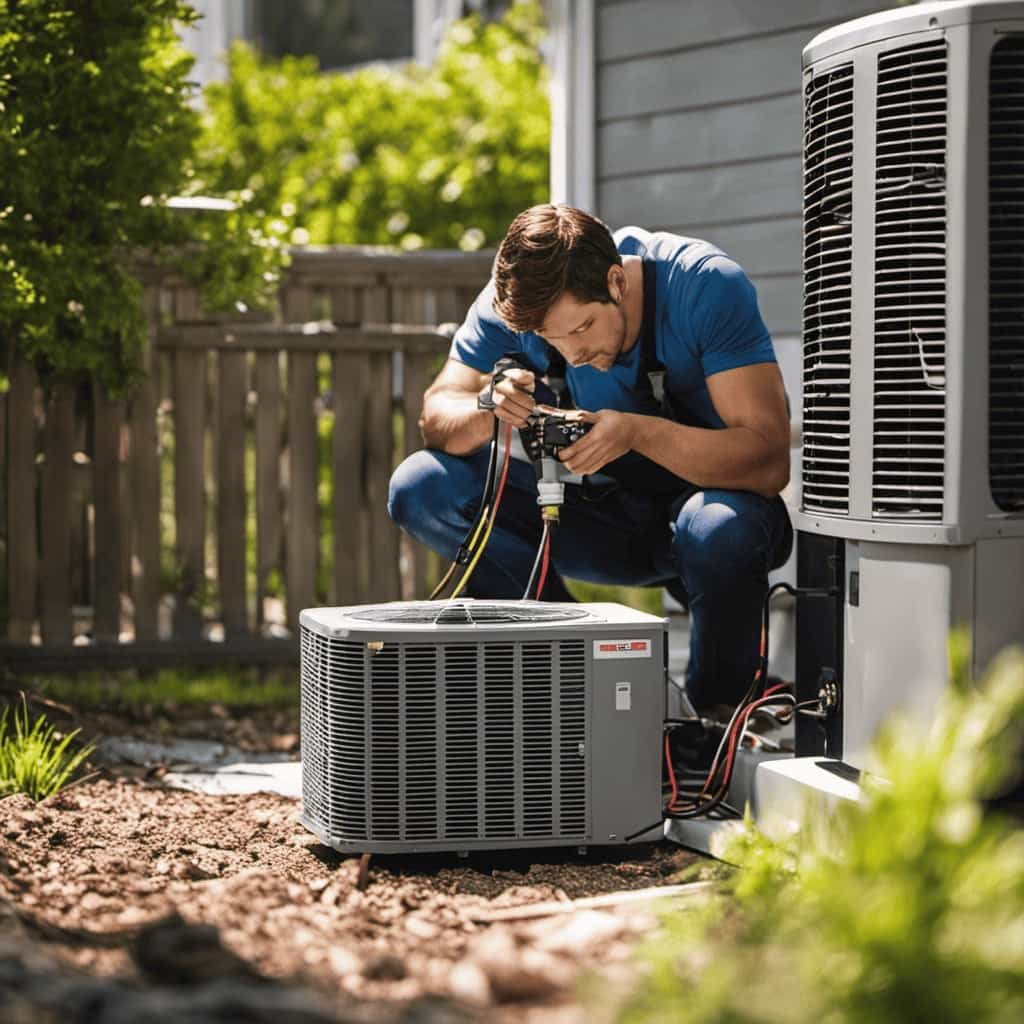
As a result, the carbon footprint of buildings equipped with ground source heat pumps is greatly reduced. According to studies, ground source heat pumps can reduce carbon emissions by up to 70% compared to conventional systems. This significant reduction in greenhouse gas emissions makes ground source heat pumps an environmentally-friendly choice for achieving energy efficiency in buildings.
Cost Savings and Return on Investment With GSHPs
The cost savings and return on investment with GSHPs are significant, making them a worthwhile investment for building owners. Here are three reasons why:
Reduced energy costs: GSHPs are highly efficient, using the constant temperature of the ground to heat and cool buildings. This results in lower energy consumption and significant cost savings on utility bills.
Long-term savings: Although the initial installation cost of GSHPs may be higher compared to traditional heating and cooling systems, the long-term savings they provide make them a cost-effective choice. With lower maintenance and operational costs, building owners can enjoy substantial savings over the lifespan of the system.
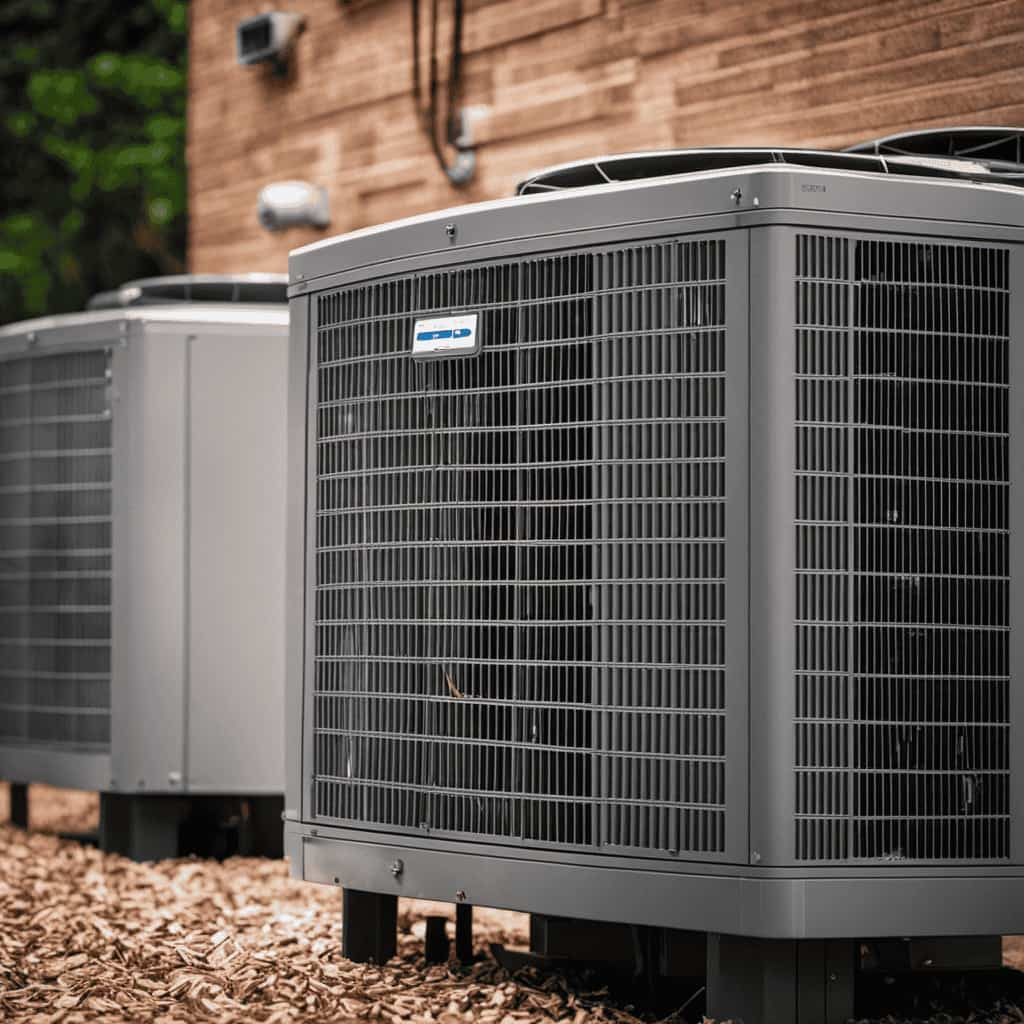
Increased property value: GSHPs are considered a valuable asset in the real estate market. Buildings equipped with these systems often have higher market value, attracting potential buyers looking for energy-efficient and sustainable properties.
Investing in GSHPs ensures cost effectiveness and long-term savings, while also contributing to a greener and more sustainable future.
Installing Ground Source Heat Pumps: What to Expect
During the installation process of ground source heat pumps, we can expect to encounter various steps and considerations. It is important to understand the benefits of geothermal energy and the cost of installation before embarking on this energy-efficient journey.
Geothermal energy offers numerous benefits, including reduced energy consumption, lower utility bills, and a smaller carbon footprint. However, the installation costs can vary depending on factors such as the size of the property, soil conditions, and the complexity of the system.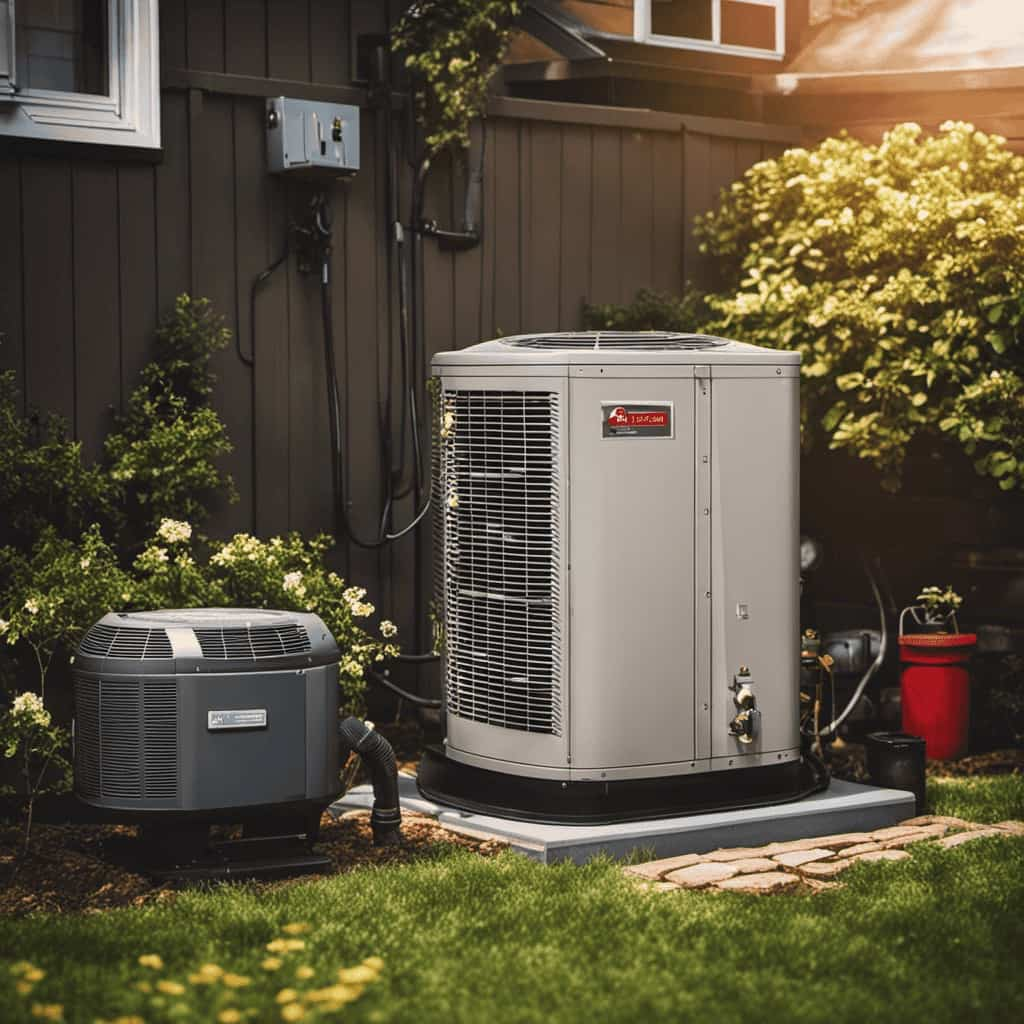
To give you an idea of the cost of installation, here is a breakdown:
| Installation Cost Factors | Average Cost Range |
|---|---|
| Property Size | $10,000 – $30,000 |
| Soil Conditions | $5,000 – $15,000 |
| System Complexity | $5,000 – $20,000 |
| Total | $20,000 – $65,000 |
GSHPs Vs. Traditional Heating and Cooling Systems
When comparing Ground Source Heat Pumps (GSHPs) to traditional heating and cooling systems, efficiency is a key factor. GSHPs have been proven to be significantly more efficient, with studies showing energy savings of up to 50-70% compared to traditional systems.
In addition, GSHPs have an environmental advantage, as they produce fewer greenhouse gas emissions and have a lower carbon footprint.
Efficiency Comparison: GSHPs Vs. Traditional
We are excited to compare the efficiency of GSHPs with traditional heating and cooling systems.

When it comes to energy efficiency, GSHPs outperform traditional systems in several ways:
GSHPs utilize the stable temperature of the ground to provide heating and cooling, reducing the need for fossil fuels and electricity consumption.
The efficiency of GSHPs is measured by the Coefficient of Performance (COP), which represents the ratio of heat output to electrical energy input. GSHPs typically have a COP of 3 to 4, meaning they produce 3 to 4 times more heat energy than the electrical energy they consume.
Traditional systems, such as furnaces and air conditioners, have lower COP values, resulting in higher energy consumption and utility bills.
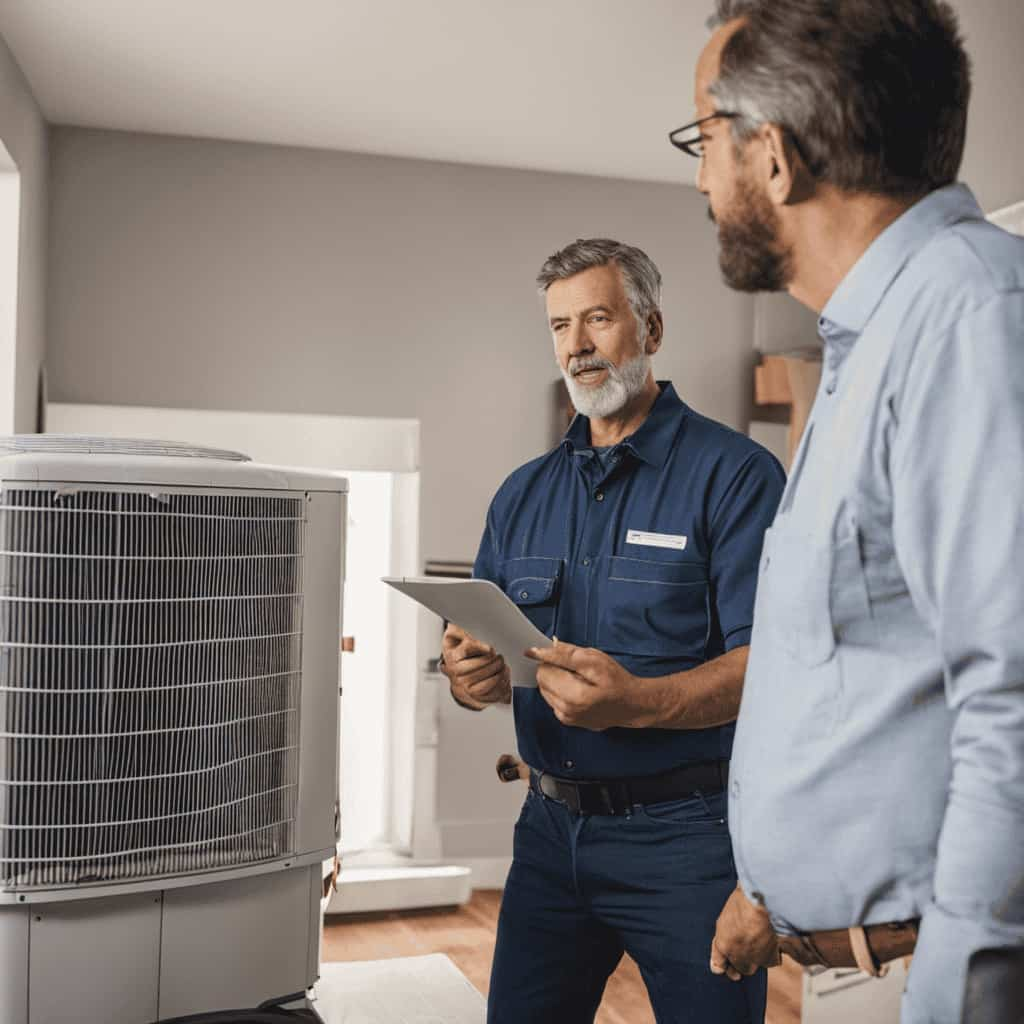
When considering cost effectiveness, GSHPs may have higher upfront installation costs, but their long-term energy savings and lower maintenance requirements make them a more affordable option in the long run.
Environmental Impact: GSHPs Advantage
Our planet’s health is at stake, and GSHPs offer a significant advantage over traditional heating and cooling systems in terms of their environmental impact. By harnessing the constant temperature of the earth, GSHPs can provide efficient heating and cooling while reducing greenhouse gas emissions and minimizing the use of fossil fuels. Let’s examine the advantages of GSHPs over traditional systems in the table below:
| Advantages of GSHPs | Environmental Benefits |
|---|---|
| Energy Efficiency | Lower Carbon Footprint |
| Renewable Energy | Reduced Air Pollution |
| Minimal Fossil Fuel Consumption | Conservation of Natural Resources |
GSHPs are highly energy efficient, with heating efficiencies up to 500% compared to the 90-98% efficiency of traditional systems. This efficiency translates to lower carbon emissions, helping to mitigate climate change. Furthermore, GSHPs utilize renewable energy sources such as geothermal heat, reducing reliance on fossil fuels and promoting sustainability. Additionally, GSHPs produce fewer air pollutants, improving air quality and reducing respiratory health issues. Lastly, GSHPs minimize the consumption of fossil fuels, preserving natural resources for future generations. With these environmental benefits, GSHPs are a greener and more sustainable choice for heating and cooling systems.
Understanding the Different Types of Ground Source Heat Pumps
In our article, we eagerly explore the different types of ground source heat pumps, which are truly revolutionizing energy efficiency. When it comes to ground source heat pumps, there are several installation methods to consider. These include horizontal, vertical, and pond/lake loop systems.
Horizontal installation method: This involves burying a network of pipes horizontally in the ground, typically at a depth of 4 to 6 feet. It’s suitable for areas with ample space and good soil conditions.
Vertical installation method: This method involves drilling boreholes vertically into the ground and inserting the pipe loops. It’s ideal for areas with limited space or poor soil conditions.
Pond/lake loop system: This method utilizes a body of water to exchange heat with the heat pump. Pipes are submerged in the water, allowing for efficient heat transfer.
Maintenance requirements for ground source heat pumps are generally low. Regular inspections, filter changes, and cleaning of the heat exchanger are recommended to ensure optimal performance and longevity.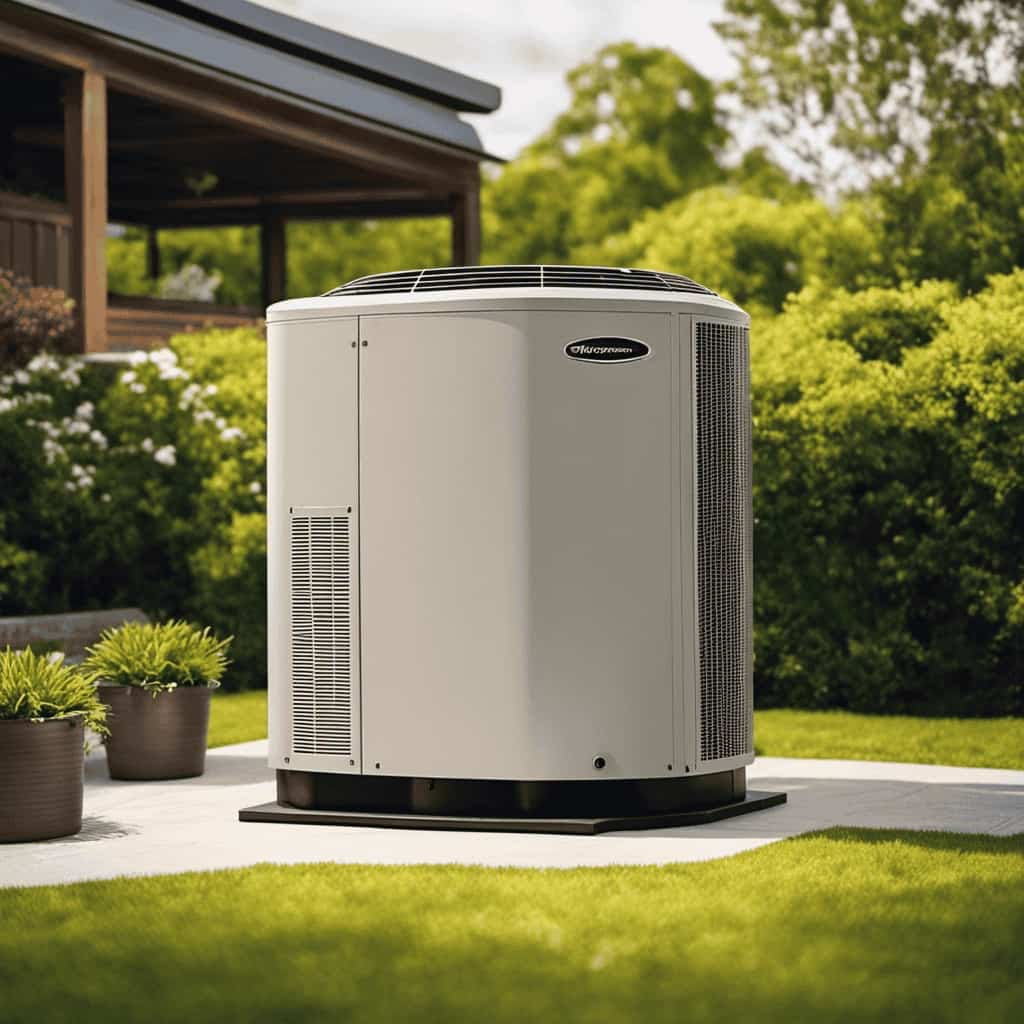
Case Studies: Real-Life Examples of GSHP Success
Three case studies demonstrate the success of ground source heat pumps (GSHPs) in real-life applications.
These examples highlight the effectiveness of GSHPs in various real estate applications, showcasing their potential for energy efficiency and cost savings.
In the first case study, a commercial building in a major city utilized a GSHP system to meet its heating and cooling needs, resulting in a significant reduction in energy consumption and greenhouse gas emissions.
The second case study focused on a residential community that integrated GSHPs into each home, resulting in lower utility bills for homeowners and increased property value.
Lastly, a government building retrofit project demonstrated the effectiveness of GSHPs in reducing energy consumption and operating costs, thanks to government incentives.
These case studies provide real-life evidence of the benefits and success of GSHPs in both commercial and residential settings, supported by government incentives.
The Future of Ground Source Heat Pumps: Innovations and Advancements
We are excited about the potential for groundbreaking innovations and advancements in the future of ground source heat pumps. As technology continues to evolve, we anticipate several innovative technologies that will shape the future market trends for ground source heat pumps.
Here are three sub-lists that highlight these exciting advancements:
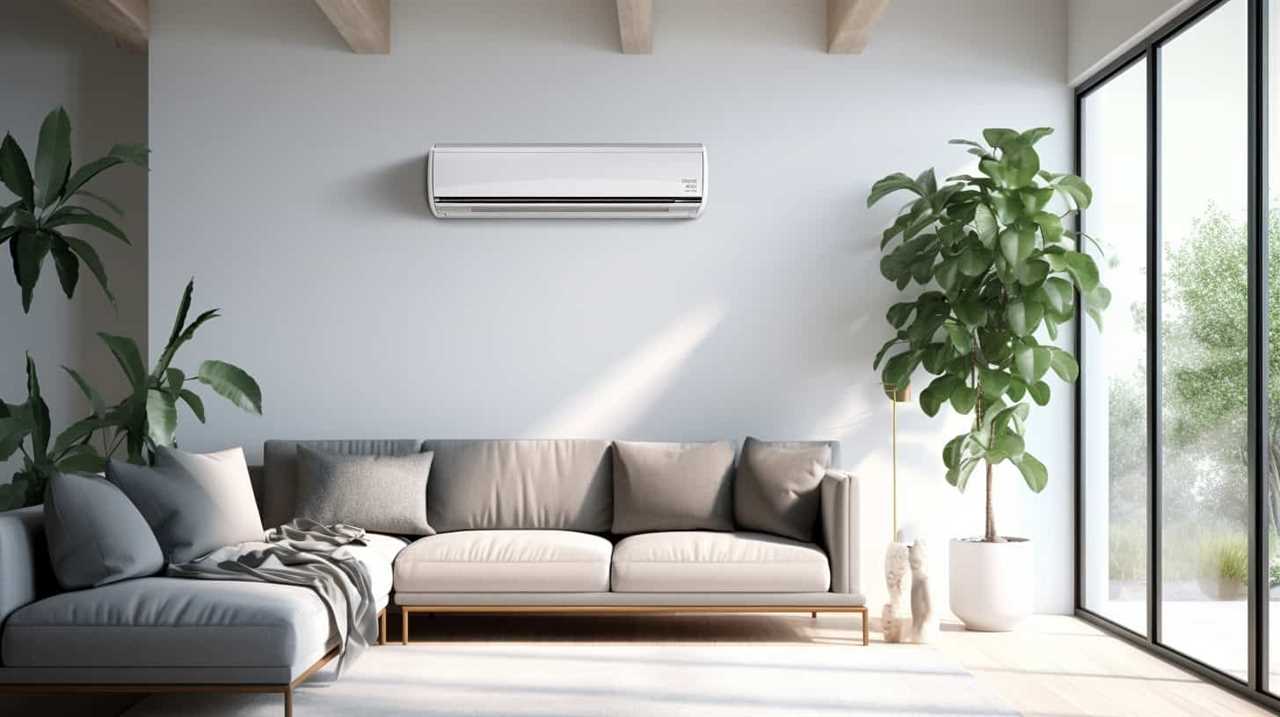
Enhanced efficiency: New heat pump designs will incorporate advanced materials and improved components to increase energy efficiency. This will result in even greater cost savings and reduced carbon emissions.
Smart controls: The integration of smart controls and machine learning algorithms will allow for more precise temperature regulation and system optimization. This will enhance comfort levels and further improve energy efficiency.
Geothermal storage: The development of geothermal storage systems will enable excess heat energy from the summer to be stored underground and used during the winter months. This will maximize the utilization of renewable energy and reduce reliance on external energy sources.
These innovative technologies and future market trends hold immense potential for transforming the ground source heat pump industry and further revolutionizing energy efficiency.
Frequently Asked Questions
How Much Does It Cost to Install a Ground Source Heat Pump?
Installing a ground source heat pump costs vary depending on factors such as system size and complexity. Comparing costs can help determine the most cost-effective option. The installation process involves drilling boreholes, laying pipes, and connecting the system to the heat pump.
Can Ground Source Heat Pumps Be Used in All Types of Climates?
Yes, ground source heat pumps can be used in all types of climates. However, their effectiveness and challenges in extreme climates should be considered. These pumps revolutionize energy efficiency and offer a sustainable solution.
Are Ground Source Heat Pumps Noisy?
Ground source heat pumps do produce some noise, but the noise levels are relatively low and can be comparable to a refrigerator or air conditioning unit. Additionally, the installation of a ground source heat pump can actually increase property value.
Do Ground Source Heat Pumps Require Regular Maintenance?
Yes, ground source heat pumps require regular maintenance to ensure their optimal performance. Regular maintenance includes checking and cleaning the system, inspecting the refrigerant levels, and servicing the components. The benefits of regular maintenance include improved efficiency and extended lifespan of the heat pump.
Are There Any Government Incentives or Rebates Available for Installing a Ground Source Heat Pump?
There are government incentives and rebates available for installing a ground source heat pump. For example, in our area, homeowners can receive a tax credit of up to 30% of the installation costs.
What Are the Keys to Achieving Efficiency with Ground Source Heat Pumps?
Ground source heat pump efficiency is crucial for achieving optimal performance. To enhance efficiency, proper installation is key ensuring correct sizing, insulation, and loop design. Regular maintenance, including filter cleaning and system checks, also play a vital role. Moreover, integrating advanced technologies and controls can maximize ground source heat pump efficiency, allowing for significant energy savings and environmentally friendly heating and cooling.
Conclusion
In conclusion, ground source heat pumps (GSHPs) have revolutionized energy efficiency by harnessing the Earth’s natural heat.
With their ability to provide both heating and cooling, GSHPs offer numerous benefits such as cost savings, reduced environmental impact, and increased comfort.
Through innovative advancements, GSHPs continue to pave the way for a sustainable future.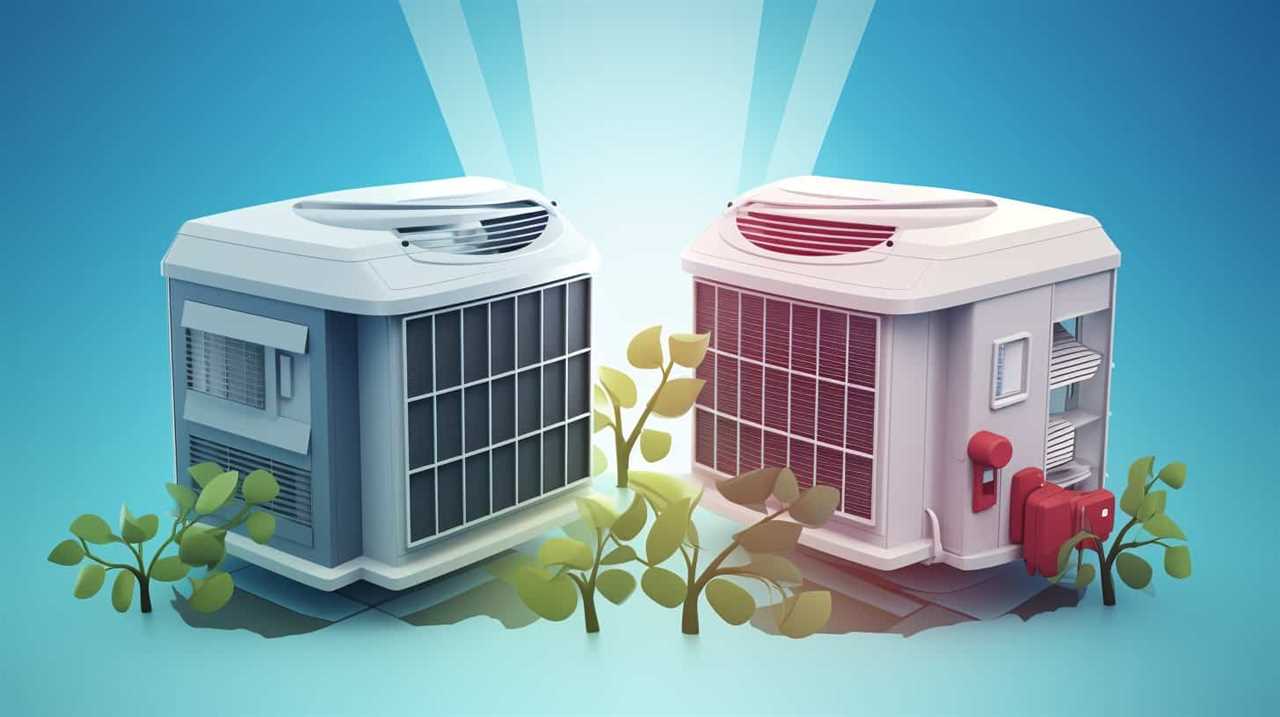
As the saying goes, ‘Don’t put all your eggs in one basket,’ and GSHPs prove to be a reliable and efficient alternative to traditional heating and cooling systems.
Energy Consumption
Optimal Electricity Usage: Top Heat Pump Efficiency Tips

Are you searching for ways to increase energy efficiency and reduce your electricity consumption? You’re in luck! We have you covered with our best heat pump efficiency tips.
By understanding efficiency ratings, sizing and installing your heat pump properly, regular maintenance, and optimizing thermostat settings, you can save both energy and money.
Plus, we’ll show you how smart home technology can further enhance your heat pump’s efficiency.
Get ready to take control of your electricity usage and enjoy the freedom of a more efficient home.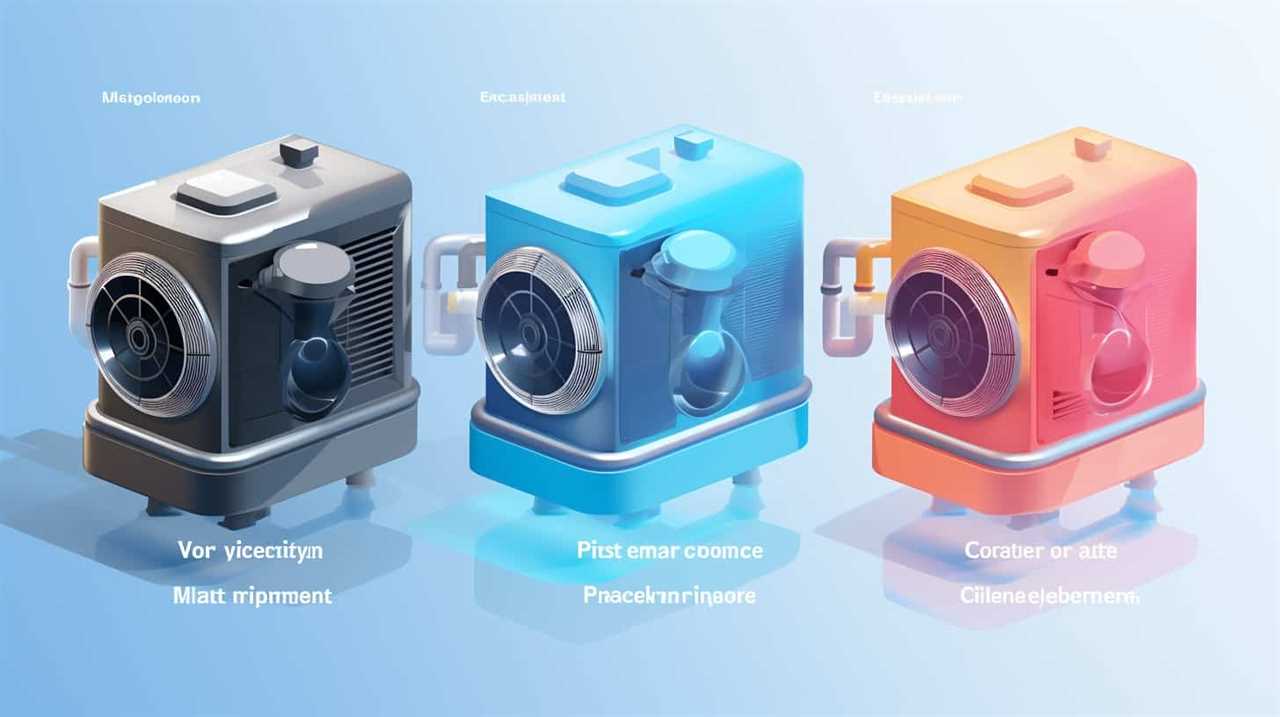
Key Takeaways
- Understanding heat pump efficiency ratings such as SEER, HSPF, and EER is crucial for maximizing energy savings.
- Proper sizing and installation of a heat pump ensures effective heating or cooling without energy waste.
- Regular maintenance and cleaning, including replacing air filters and cleaning the outdoor unit, can improve heat pump efficiency.
- Optimizing thermostat settings and supplementing with smart home technology can enhance energy efficiency and control electricity usage.
Understanding Heat Pump Efficiency Ratings
We’ll start by exploring the three main heat pump efficiency ratings. When it comes to heat pump technology and energy efficient heating, understanding these ratings is crucial.
The first rating to consider is the Seasonal Energy Efficiency Ratio (SEER). This measures the cooling efficiency of the heat pump and is calculated by dividing the cooling output by the energy input over a typical cooling season.
The second rating is the Heating Seasonal Performance Factor (HSPF), which measures the heating efficiency of the heat pump. It’s calculated by dividing the total heating output by the total electrical energy input over a typical heating season.
The third rating is the Energy Efficiency Ratio (EER), which measures the cooling efficiency of the heat pump at a specific outdoor temperature.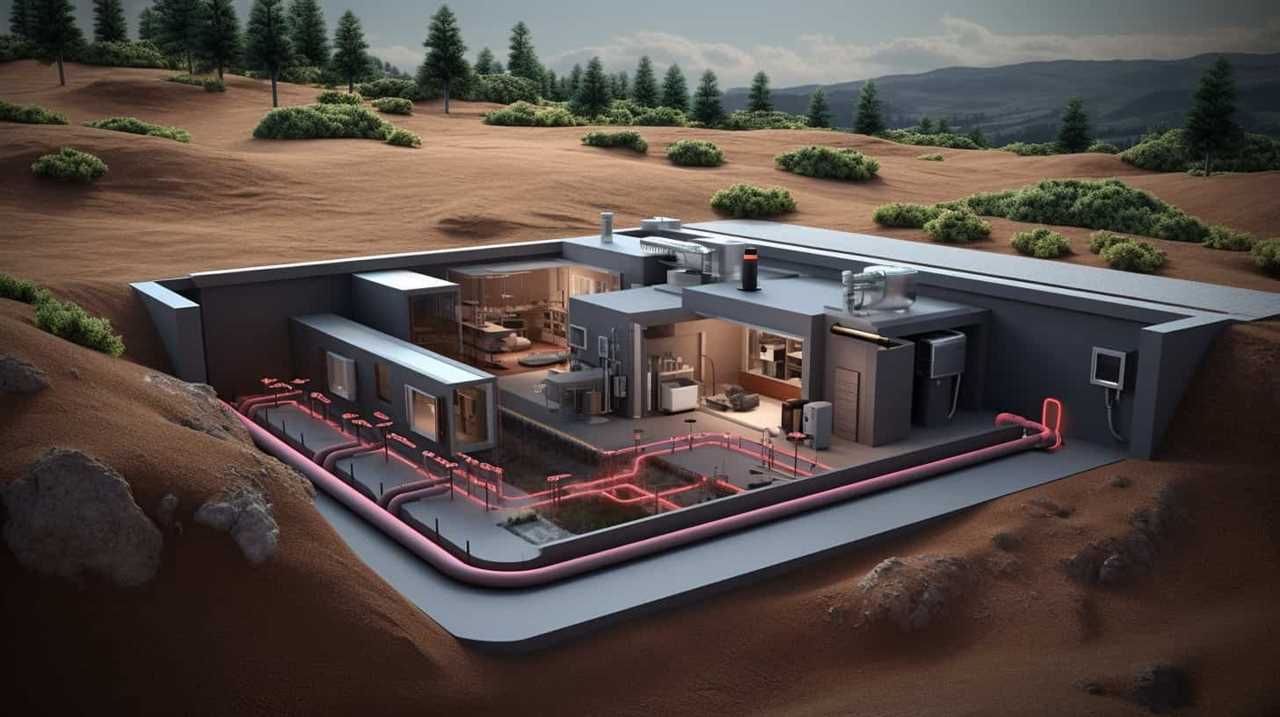
Proper Sizing and Installation for Maximum Efficiency
For maximum efficiency, we recommend ensuring proper sizing and installation of your heat pump.
Proper sizing is crucial to ensure that your heat pump can effectively heat or cool your space without wasting energy. A heat pump that’s too small will struggle to meet the demands of your home, leading to increased energy consumption and higher utility bills. On the other hand, a heat pump that’s too large will cycle on and off frequently, resulting in inefficient operation and unnecessary wear and tear. To determine the right size for your heat pump, it’s best to consult with a professional HVAC technician who can perform a load calculation based on the size and layout of your home.
Additionally, proper installation is essential for optimal performance. Improper installation can lead to air leakage, reduced efficiency, and potential safety hazards. It’s crucial to hire a qualified and experienced HVAC contractor to ensure that your heat pump is installed correctly.
Regular heat pump maintenance is also important for energy savings. Cleaning or replacing air filters regularly, inspecting and cleaning coils, and checking refrigerant levels can all help improve the efficiency of your heat pump.

Regular Maintenance and Cleaning to Improve Efficiency
Regular maintenance and cleaning are essential to improve the efficiency of our heat pump. By following proper maintenance schedules and regularly cleaning our heat pump, we can ensure that it operates at optimal efficiency. Here are three important steps to consider:
Regular filter replacement: One of the simplest yet most effective ways to improve heat pump efficiency is by regularly replacing the air filters. Clogged filters restrict airflow, forcing the system to work harder and use more energy. By replacing the filters as recommended by the manufacturer, we can ensure proper airflow and maximize efficiency.
Cleaning the outdoor unit: The outdoor unit of the heat pump can accumulate dirt, leaves, and debris over time, obstructing airflow. Regularly cleaning the unit by removing any debris and ensuring unobstructed airflow can significantly improve efficiency and prevent potential issues.
Professional maintenance: It’s also advisable to schedule regular professional maintenance for our heat pump. A qualified technician can inspect and clean the system thoroughly, identifying any potential issues and ensuring that all components are functioning optimally.
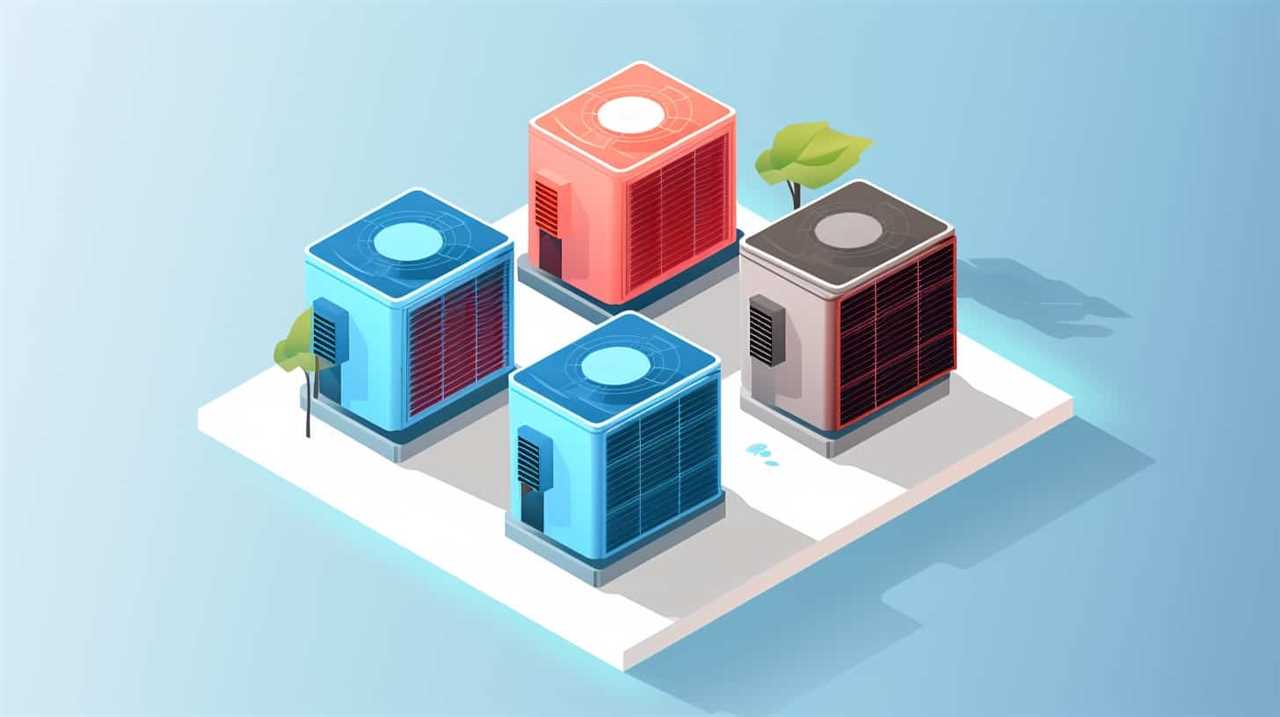
Optimizing Thermostat Settings for Energy Savings
The optimal thermostat settings can significantly impact our energy savings. By setting our thermostats to energy efficient temperature settings, we can reduce our energy consumption and save money on our electricity bills. Smart home automation systems can also help us achieve these energy savings by allowing us to control and monitor the temperature settings remotely. Here is a table showcasing some recommended temperature settings for different scenarios:
| Scenario | Recommended Temperature |
|---|---|
| Occupied | 68-72°F |
| Sleeping | 65-68°F |
| Away | 60-65°F |
Supplementing With Smart Home Technology for Enhanced Efficiency
With smart home technology, we can enhance our efficiency in using heat pumps by integrating automated controls and monitoring systems. By incorporating smart home automation into our heating systems, we can optimize energy usage and reduce wasted electricity. Here are three ways smart home technology can help us achieve enhanced efficiency:
Automated Scheduling: Smart thermostats allow us to create customized heating schedules based on our daily routines. This ensures that the heat pump operates only when needed, saving energy and reducing electricity bills.
Remote Access: With smart home automation, we can control our heat pumps remotely through smartphone apps. This allows us to adjust the temperature and monitor energy usage even when we’re away from home, giving us greater control and flexibility.

Energy Monitoring: Smart home systems provide real-time energy consumption data, allowing us to track our usage and identify areas of improvement. By understanding how much energy our heat pumps are using, we can make informed decisions to optimize efficiency and reduce waste.
Frequently Asked Questions
Are There Any Government Incentives or Rebates Available for Homeowners Who Install Heat Pumps?
There are government incentives and energy rebates available for homeowners who install heat pumps. These incentives and rebates can help offset the cost of installation and encourage energy-efficient practices in homes.
Can a Heat Pump Be Used in Extremely Cold Climates, or Is It Only Effective in Moderate Temperatures?
Can a heat pump handle extreme cold or only work in moderate temperatures? We’ll explore heat pump efficiency in both scenarios and share maintenance tips for optimal performance and longevity.
How Long Does a Heat Pump Typically Last Before Needing to Be Replaced?
Heat pumps typically last around 15-20 years before needing replacement. Regular heat pump maintenance, such as cleaning filters and checking for signs of a failing heat pump, can help extend its lifespan.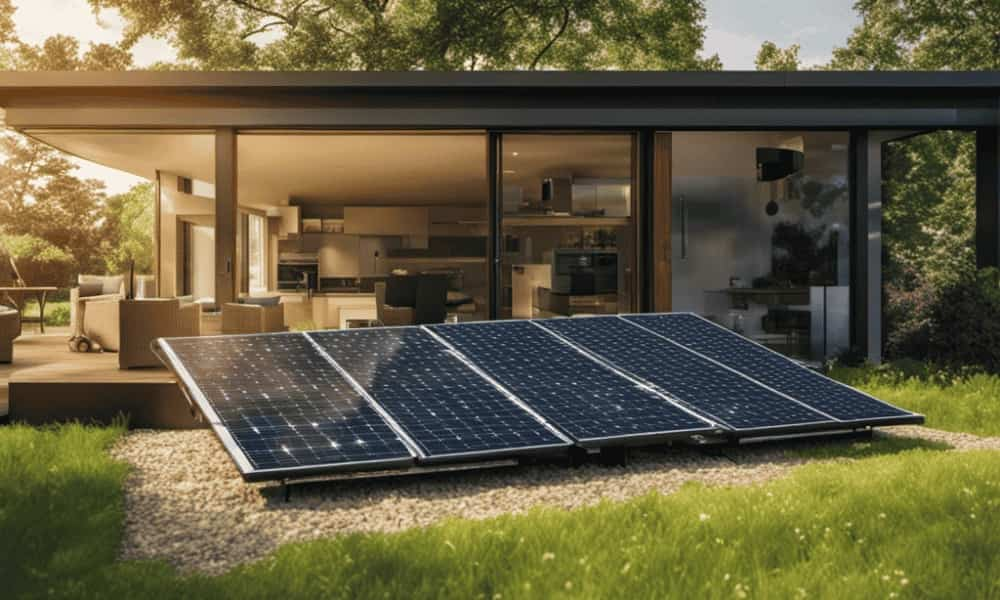
Are There Any Common Issues or Problems That Can Arise With a Heat Pump System?
Common issues with heat pump systems can include refrigerant leaks, frozen coils, and inadequate heating or cooling. Troubleshooting heat pump problems may involve checking for proper airflow, ensuring thermostat settings are correct, and scheduling regular maintenance.
Can a Heat Pump Be Used for Both Heating and Cooling, or Is It Primarily Designed for One Function?
A heat pump can be used for both heating and cooling. It is designed to efficiently transfer heat from one location to another, making it versatile in its applications for both hot and cold climates.
How Can I Maximize the Energy Efficiency of My Heat Pump from a Top Brand?
Looking for ways to maximize the energy efficiency of your heat pump? Start by investing in one of the top heat pump brands for energy efficiency. These brands prioritize eco-friendly features and advanced technology, ensuring your heat pump operates at its full potential. Additionally, regular maintenance, proper insulation, and optimizing thermostat settings can further enhance the energy efficiency of your heat pump from a top brand.
Conclusion
To sum it up, by following these heat pump efficiency tips, we can zap our energy bills and keep our homes cozy without breaking a sweat. With proper sizing, installation, regular maintenance, and optimized thermostat settings, we can make sure our heat pumps are running at their best.
And for those looking for extra efficiency, smart home technology can be the cherry on top.
Let’s stay warm and save energy, all while keeping our wallets happy.
Energy Consumption
Instant HVAC Efficiency Gains With Heat Pump Systems

Are you exhausted from receiving high energy bills and dealing with inefficient HVAC systems? You’re in luck! We have the perfect solution for you.
With heat pump systems, we can instantly improve your HVAC efficiency, saving you money and reducing your carbon footprint. These systems are packed with key features and benefits that will revolutionize your home’s heating and cooling.
Don’t settle for outdated technology, join us as we explore the world of heat pump systems and unlock the true potential of your HVAC system.
Key Takeaways
- Heat pump systems reduce the carbon footprint associated with heating and cooling processes.
- They provide both heating and cooling capabilities, reducing reliance on fossil fuels.
- Heat pump systems offer cost savings through reduced energy consumption and lower utility bills.
- They can be integrated with renewable energy sources like solar panels or geothermal energy.
The Importance of Heat Pump Systems in HVAC Efficiency
We believe that heat pump systems play a crucial role in improving HVAC efficiency.
Heat pump systems have the potential to significantly reduce the carbon footprint associated with heating and cooling processes. By utilizing renewable energy sources such as air, ground, or water, heat pumps can extract heat from these sources and transfer it into buildings, providing both heating and cooling capabilities. This reduces the reliance on fossil fuels and decreases greenhouse gas emissions, ultimately contributing to a greener and more sustainable environment.
Additionally, heat pump systems offer potential cost savings in HVAC operations. They’re highly efficient in converting energy, resulting in reduced energy consumption and lower utility bills. With their ability to provide both heating and cooling, heat pump systems offer a versatile and cost-effective solution for HVAC needs.
Transitioning into the subsequent section, let’s explore the key features and benefits of heat pump systems.
Key Features and Benefits of Heat Pump Systems
Heat pump systems offer numerous key features and benefits to enhance HVAC efficiency.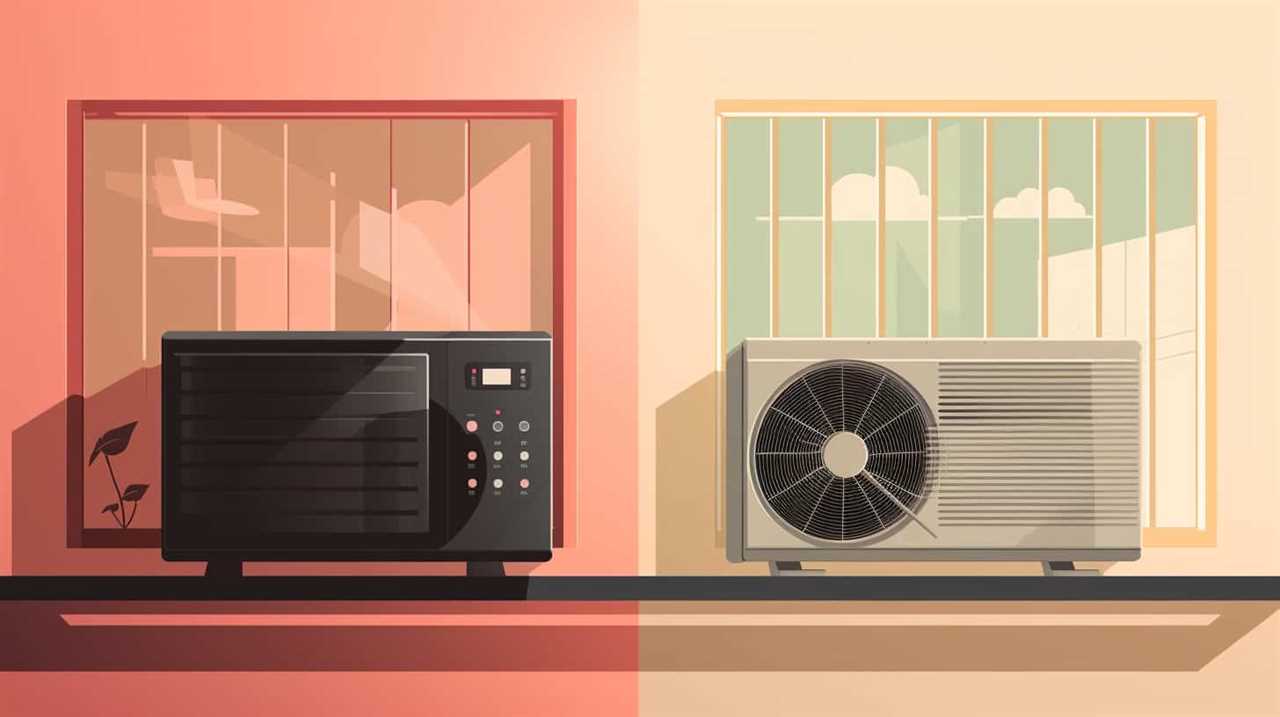
One of the most significant advantages is energy savings. Heat pumps are highly efficient in transferring heat from one area to another, making them more energy-efficient compared to traditional heating and cooling systems. This results in lower energy consumption and reduced utility bills for homeowners and businesses.
Additionally, heat pumps have a lower environmental impact. They use renewable energy sources such as air or ground heat, reducing greenhouse gas emissions and dependence on fossil fuels.
How Heat Pump Systems Improve Energy Efficiency in HVAC
By optimizing heat transfer and reducing energy consumption, heat pump systems significantly enhance the energy efficiency of HVAC systems. These systems offer several advantages that contribute to cost savings and reduce environmental impact:
Improved Heat Transfer: Heat pump systems transfer heat from one location to another, rather than generating it from scratch. This process requires less energy compared to traditional heating and cooling methods.

Dual Functionality: Heat pump systems provide both heating and cooling capabilities, eliminating the need for separate systems. This reduces energy consumption and maintenance costs.
Renewable Energy Integration: Heat pump systems can be integrated with renewable energy sources, such as solar panels or geothermal energy, further reducing reliance on fossil fuels.
With these benefits, heat pump systems offer a sustainable and cost-effective solution for HVAC needs.
In the following section, we’ll explore tips for maximizing HVAC efficiency with heat pump systems.

Tips for Maximizing HVAC Efficiency With Heat Pump Systems
To optimize HVAC efficiency with heat pump systems, we recommend implementing proper maintenance and regular inspections. By following these energy-saving tips and ensuring regular heat pump maintenance, you can maximize the efficiency of your HVAC system.
Firstly, it’s important to clean or replace air filters regularly. Dirty filters restrict airflow and reduce the system’s efficiency. Additionally, keeping the outdoor unit clean and free from debris allows for better heat exchange.
Next, consider installing a programmable thermostat. This allows you to set different temperatures for specific times of the day, ensuring your system only runs when needed.
Regularly checking and sealing any air leaks in your home can also help improve efficiency. Leaks can waste energy by allowing conditioned air to escape and allowing unconditioned air to enter.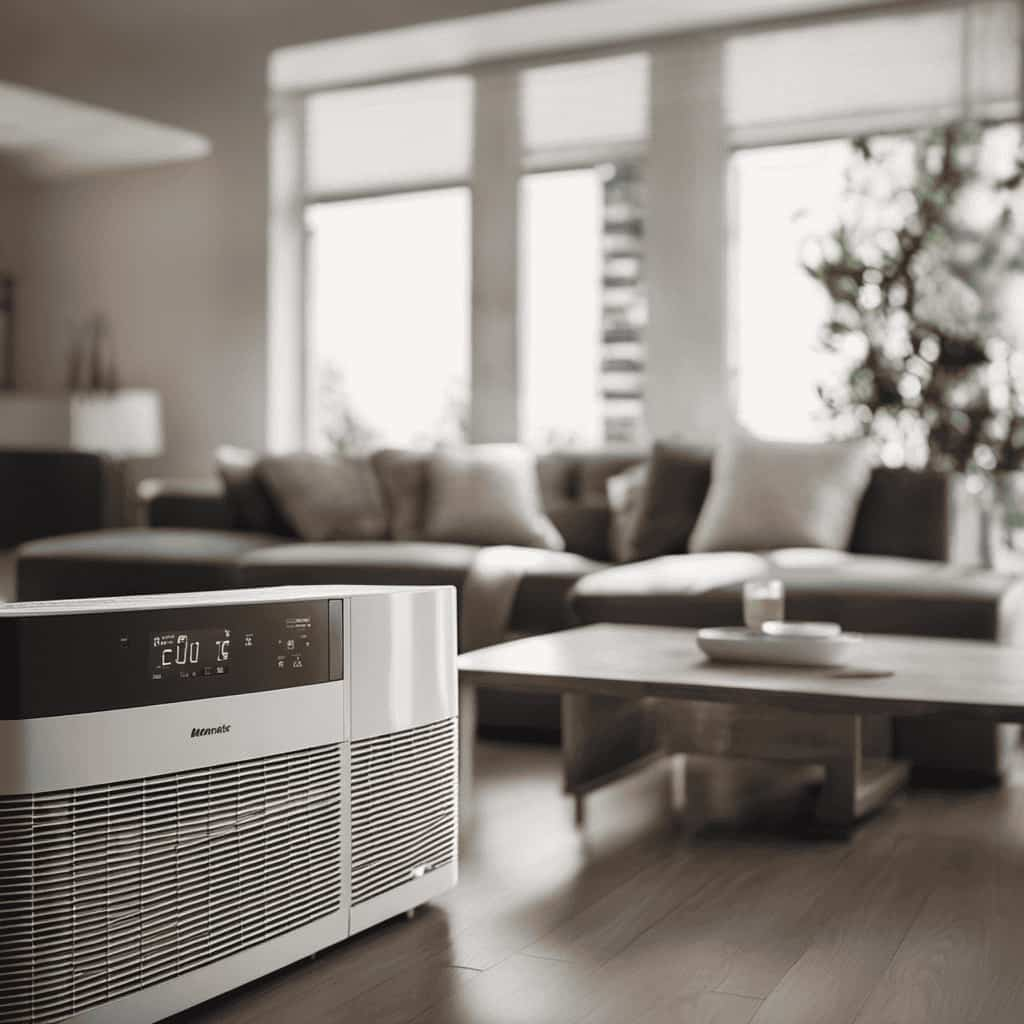
Lastly, scheduling professional maintenance and inspections twice a year can ensure that your heat pump system is running at its peak efficiency. A professional can identify and address any issues before they become major problems.
Case Studies: Real-Life Examples of HVAC Efficiency Gains With Heat Pump Systems
We frequently examine real-life case studies that demonstrate the HVAC efficiency gains achieved with heat pump systems. These case studies provide real-world examples of how heat pump systems can significantly improve HVAC efficiency.
Here are two sub-lists that showcase the benefits of heat pump systems:
Case Study 1: Residential Setting
- A homeowner in a cold climate replaced their traditional HVAC system with a heat pump system.
- The heat pump system reduced their heating costs by 30% and their cooling costs by 40%.
- The homeowner also experienced improved comfort levels throughout their home.
Case Study 2: Commercial Building
- A commercial building in a hot and humid area upgraded their HVAC system to a heat pump system.
- The heat pump system reduced energy consumption by 25% and lowered maintenance costs.
- The building occupants reported increased satisfaction with the indoor air quality and temperature control.
These case studies demonstrate the real-life benefits of using heat pump systems to achieve HVAC efficiency gains. By adopting this technology, both residential and commercial properties can enjoy significant energy savings and improved comfort.
Frequently Asked Questions
How Much Does a Heat Pump System Cost to Install and Maintain?
Installing and maintaining a heat pump system can vary greatly in cost. However, when considering the cost comparison and potential energy savings, investing in a heat pump system can lead to long-term savings and increased HVAC efficiency.
Are Heat Pump Systems Suitable for Both Residential and Commercial HVAC Applications?
Heat pump systems offer remarkable efficiency gains in both residential and commercial HVAC applications. The benefits include increased energy savings, reduced carbon footprint, and improved indoor comfort. They’re a cost-effective and sustainable solution for all your heating and cooling needs.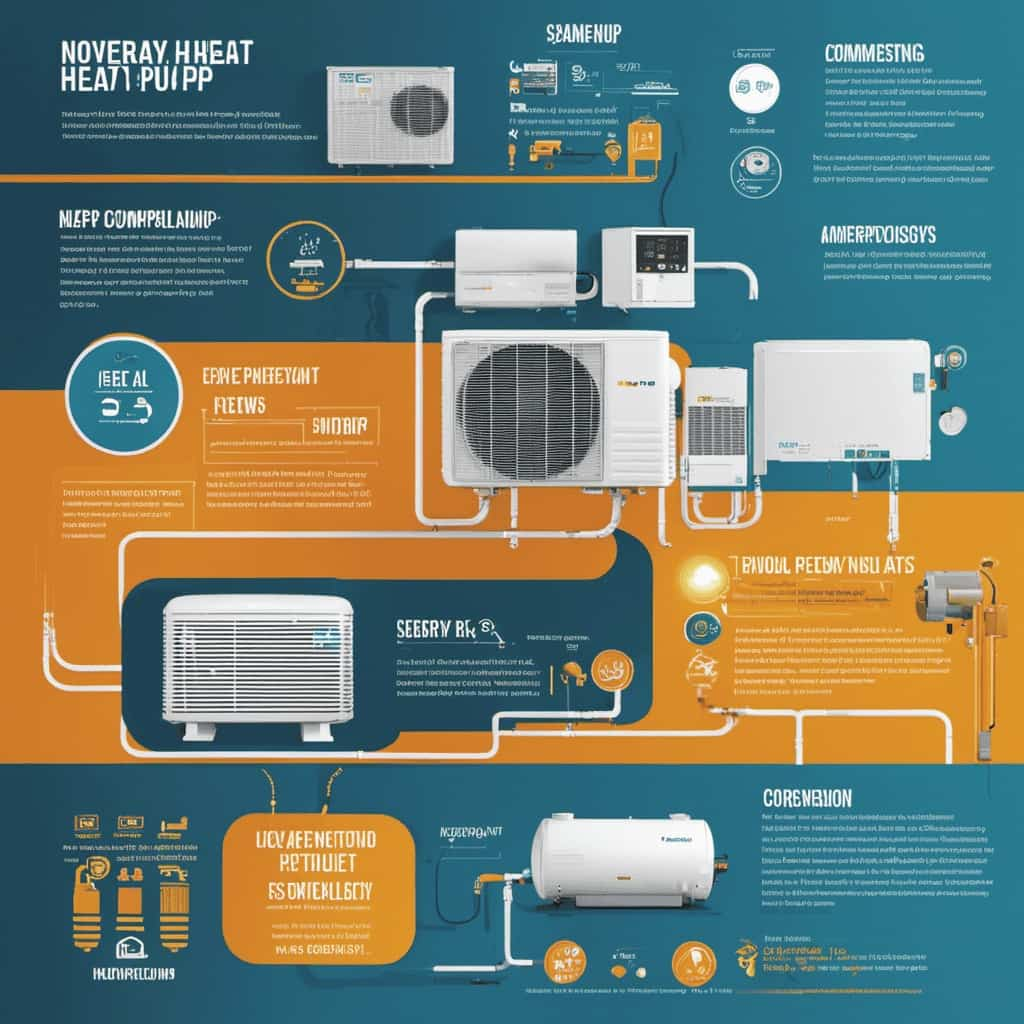
What Is the Lifespan of a Heat Pump System and When Should It Be Replaced?
When it comes to the lifespan of a heat pump system and signs of replacement, it’s important to consider factors like regular maintenance, efficiency decline, and major repairs. Consulting with a professional can help determine the best course of action.
Can Heat Pump Systems Be Used in Conjunction With Other HVAC Systems?
Yes, heat pump systems can be used in conjunction with other HVAC systems. By integrating a heat pump with traditional HVAC, we can achieve greater efficiency and energy savings, ensuring optimal comfort and liberation from high energy costs.
Are There Any Government Incentives or Rebates Available for Installing a Heat Pump System?
Government incentives and rebates are available for installing heat pump systems, providing energy savings and reducing costs. These incentives vary depending on location and may include tax credits or utility rebates.
How Do Heat Pump Systems Help in Saving Energy for HVAC Systems?
Heat pump systems play a vital role in conserving energy for HVAC systems. These energy-efficient heat pump systems reviewed have the ability to extract heat from the outside air, even during colder months, and transfer it indoors. By utilizing this renewable source of energy, heat pumps drastically reduce the amount of electricity required for heating and cooling, resulting in substantial energy savings.
Conclusion
In conclusion, heat pump systems are the superheroes of HVAC efficiency, swooping in to save the day with their incredible energy-saving abilities. With their key features and benefits, heat pump systems elevate the efficiency of HVAC systems to new heights.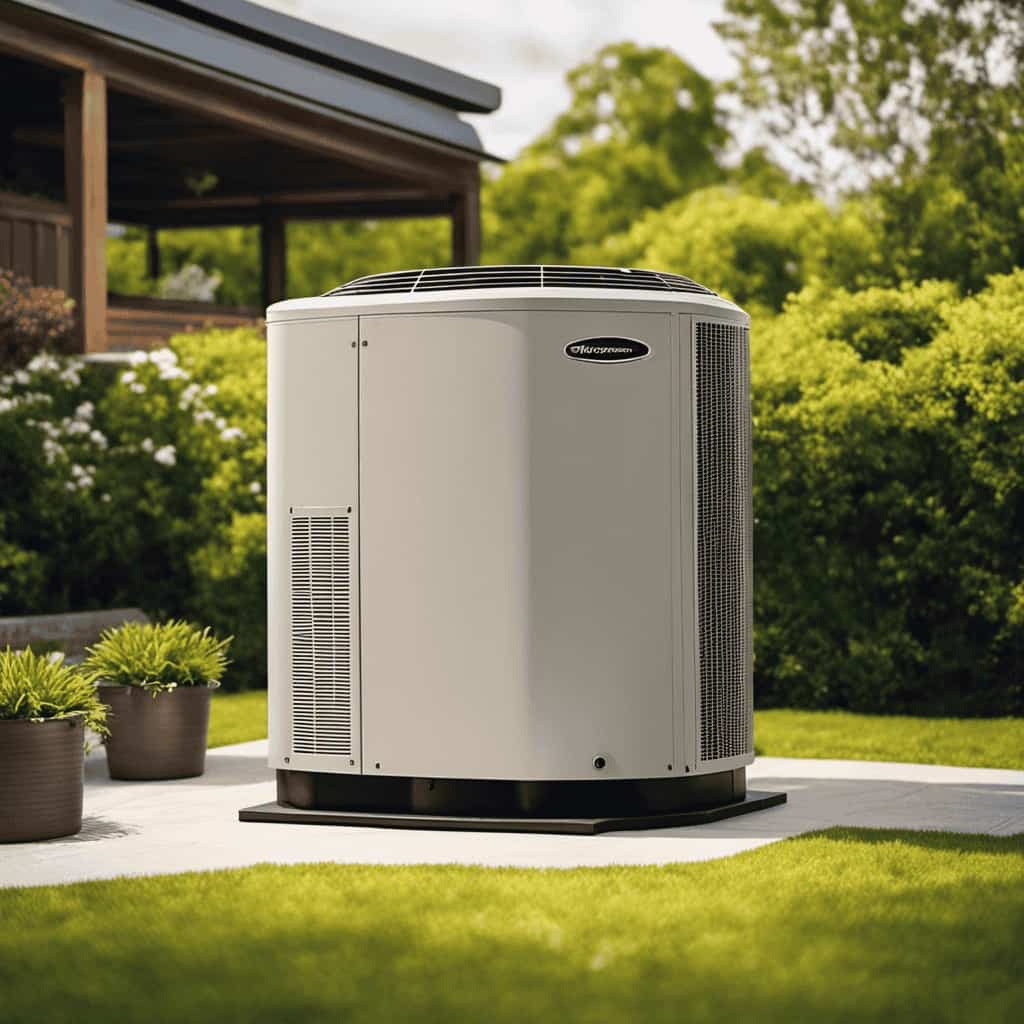
By following our tips, you can maximize the efficiency gains and witness the magic of heat pumps firsthand. So join the efficiency revolution and let heat pump systems be the driving force in your HVAC journey.
Together, we can conquer energy wastage and create a more sustainable future.
Energy Consumption
Enhancing Heat Pump Performance With Energy Efficiency Ratings

Did you realize that energy efficiency ratings can significantly improve the performance of your heat pump? In this article, we’ll delve into how these ratings affect heat pump efficiency and offer advice on selecting a unit with a high rating.
Understanding energy efficiency labels and maximizing performance through these ratings is crucial for reducing energy consumption and saving money.
Let’s dive into the world of heat pump performance and energy efficiency to ensure you make the most informed decisions for your home.
Key Takeaways
- Energy efficiency ratings enhance heat pump performance
- Higher ratings result in lower energy bills and reduced greenhouse gas emissions
- Understanding ratings helps homeowners make informed decisions
- Prioritize higher energy efficiency ratings for maximizing heat pump performance
The Importance of Energy Efficiency Ratings for Heat Pumps
We believe that understanding the importance of energy efficiency ratings for heat pumps can significantly impact our decision-making process when it comes to choosing the most effective heating and cooling system for our homes.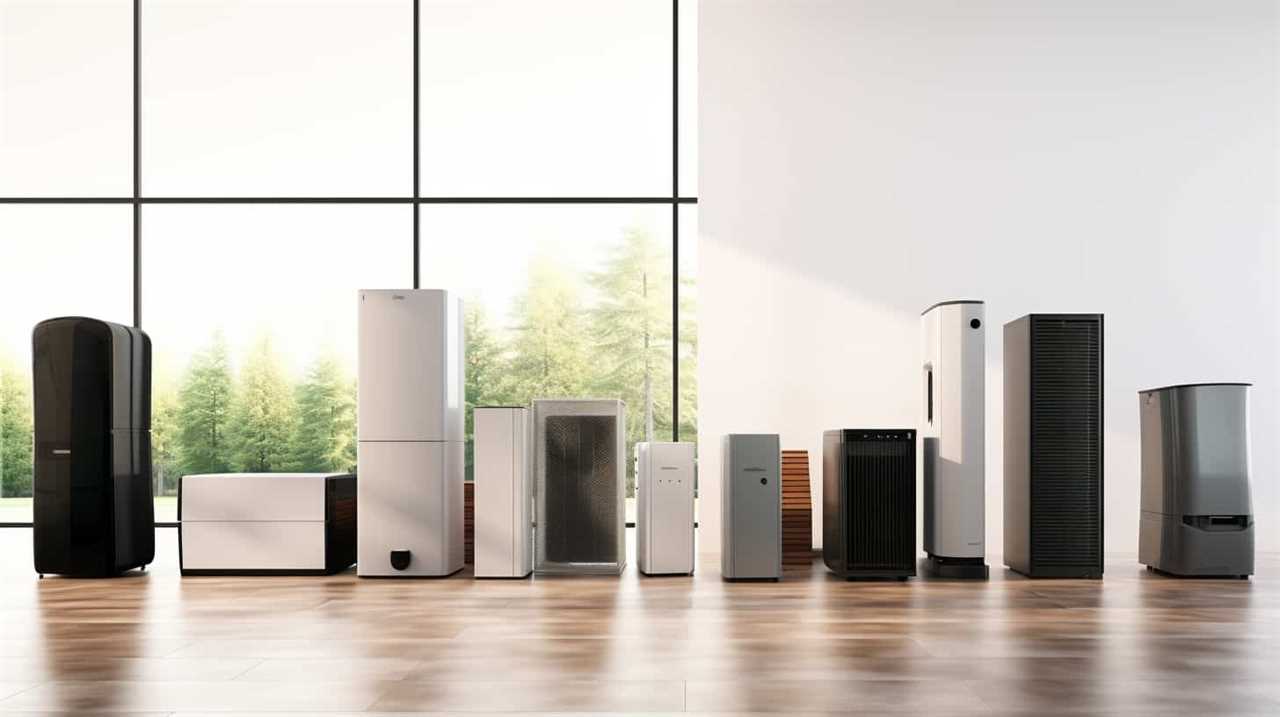
Energy efficiency ratings provide valuable information about how efficiently a heat pump can convert energy into heating or cooling, which directly affects energy savings and environmental impact.
Higher energy efficiency ratings indicate that the heat pump consumes less energy to produce the same level of heating or cooling, resulting in lower energy bills and reduced greenhouse gas emissions.
By considering energy efficiency ratings, we can make informed choices that not only save money but also contribute to a more sustainable future.
How Energy Efficiency Ratings Impact Heat Pump Performance
Considering energy efficiency ratings is crucial for understanding how heat pump performance is impacted. These ratings provide valuable information about the energy savings and cost effectiveness of a heat pump. By choosing a heat pump with a higher energy efficiency rating, homeowners can save money on their energy bills and reduce their carbon footprint. The table below illustrates the impact of different energy efficiency ratings on energy savings and cost effectiveness: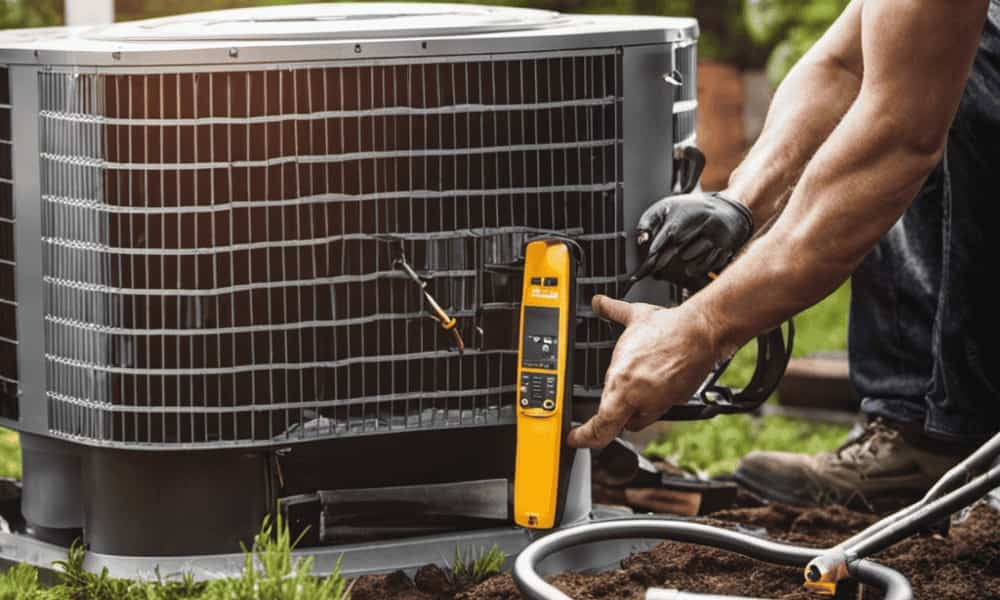
| Energy Efficiency Rating | Energy Savings | Cost Effectiveness |
|---|---|---|
| High | Significant | Excellent |
| Medium | Moderate | Good |
| Low | Minimal | Poor |
As the table shows, heat pumps with higher energy efficiency ratings not only provide greater energy savings but also offer better cost effectiveness. Understanding these ratings can help homeowners make informed decisions when purchasing a heat pump. In the next section, we will explore the importance of understanding energy efficiency labels for heat pumps.
Understanding Energy Efficiency Labels for Heat Pumps
Energy efficiency labels provide valuable information about the performance and energy savings of heat pumps. Understanding these labels is crucial for making informed decisions about heat pump energy consumption and choosing energy efficient HVAC systems.
The labels typically include important details such as the Seasonal Energy Efficiency Ratio (SEER), Heating Seasonal Performance Factor (HSPF), and Energy Efficiency Ratio (EER). SEER measures the cooling efficiency of the heat pump, while HSPF measures its heating efficiency. EER, on the other hand, provides information about the heat pump’s energy efficiency at a specific temperature.
These ratings allow consumers to compare different heat pump models and choose the one that best meets their energy efficiency needs. By utilizing energy efficiency labels, consumers can make informed choices and reduce their energy consumption while enjoying the benefits of a highly efficient heat pump.
Tips for Choosing a High Energy Efficiency Rated Heat Pump
To ensure optimal energy savings and performance, it’s important to choose a heat pump with a high energy efficiency rating. Here are some tips to help you select the right one.
First, look for heat pumps that are ENERGY STAR certified. This label indicates that the product meets strict energy efficiency standards set by the Environmental Protection Agency.
Second, consider the Seasonal Energy Efficiency Ratio (SEER) and Heating Seasonal Performance Factor (HSPF) ratings. The higher these ratings, the more energy efficient the heat pump will be.
Third, pay attention to the size of the heat pump. Make sure it’s properly sized for your home or space to ensure efficient operation.
Finally, read reviews and compare different models to find the one that best fits your needs.
Maximizing Heat Pump Performance Through Energy Efficiency Ratings
By prioritizing higher energy efficiency ratings and utilizing the appropriate maintenance practices, we can maximize the performance of our heat pump. Improving heat pump efficiency and optimizing energy usage is crucial for reducing energy consumption and saving money. To help you understand the impact of energy efficiency ratings on heat pump performance, let’s take a look at the following table:
| Energy Efficiency Rating | Annual Energy Cost | Savings Compared to Standard Model |
|---|---|---|
| Standard Model (SEER 13) | $1,200 | – |
| High Efficiency Model (SEER 20) | $900 | $300 |
| Super Efficiency Model (SEER 25) | $750 | $450 |
As you can see, opting for a higher energy efficiency rating can lead to significant savings in annual energy costs. Additionally, regular maintenance, such as cleaning or replacing filters, checking refrigerant levels, and inspecting ductwork, can further enhance your heat pump’s efficiency and performance. By taking these steps, we can ensure that our heat pump operates at its best and provides us with optimal comfort while minimizing energy consumption.
Frequently Asked Questions
How Often Should I Have My Heat Pump Serviced to Maintain Its Energy Efficiency Rating?
We recommend regular heat pump maintenance to maintain its energy efficiency rating. Follow these tips for improving heat pump energy efficiency: clean or replace filters regularly, schedule professional inspections, and keep the outdoor unit clear of debris.
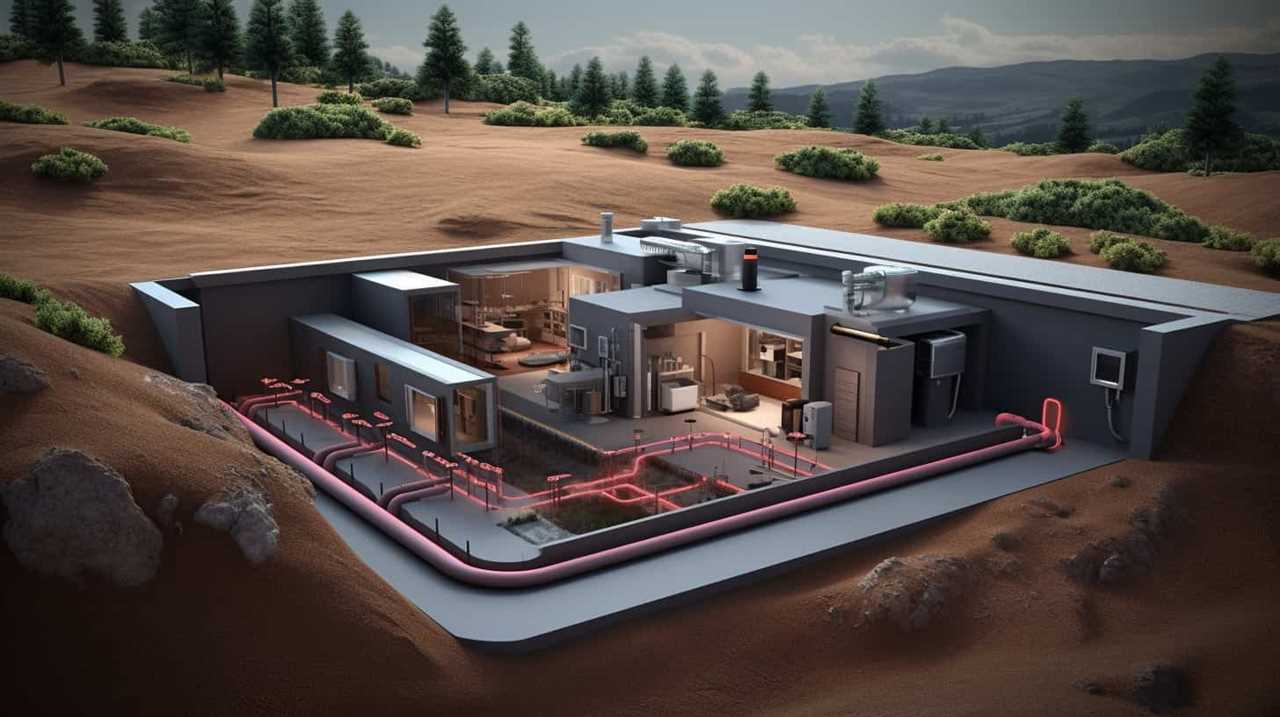
Are There Any Government Incentives or Rebates Available for Purchasing a High Energy Efficiency Rated Heat Pump?
There are government incentives and rebates available for purchasing a high energy efficiency rated heat pump. These incentives can help offset the cost of the heat pump and encourage energy efficiency.
Can I Increase the Energy Efficiency Rating of My Existing Heat Pump Without Replacing It?
We can optimize the performance of our existing heat pump by increasing its energy efficiency rating. This can be achieved through regular maintenance, proper insulation, and using a programmable thermostat.
What Factors Should I Consider When Choosing the Right Size Heat Pump for My Home to Maximize Energy Efficiency?
When choosing the right size heat pump for our home to optimize energy efficiency, we consider factors such as square footage, climate, insulation, and ductwork. Proper sizing ensures maximum performance and cost savings.
Are There Any Specific Maintenance Tasks or Best Practices I Should Follow to Ensure Optimal Energy Efficiency and Performance From My Heat Pump?
To ensure optimal energy efficiency and performance from our heat pump, we follow specific maintenance tasks and best practices. Regularly cleaning and replacing air filters, checking refrigerant levels, and scheduling professional inspections are some of the key heat pump maintenance tips for improving energy efficiency.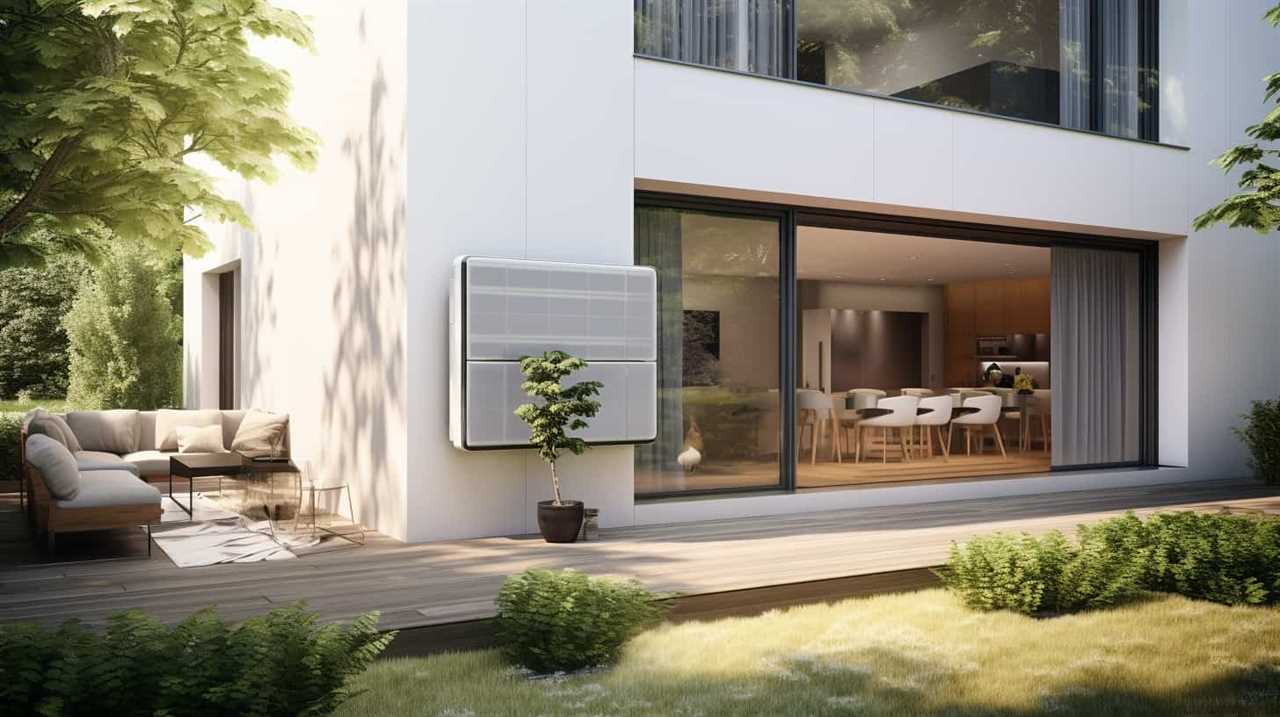
How Do Energy Efficiency Ratings Contribute to Optimizing Heat Pump Systems?
Energy efficiency ratings play a crucial role in optimizing heat pump systems. These ratings determine the system’s ability to convert energy into usable heat effectively. By considering an energy-efficient heat pump, you can lower energy consumption, reduce utility bills, and minimize environmental impact. Optimizing heat pump systems through higher efficiency ratings creates a win-win situation for homeowners and the planet.
Conclusion
In conclusion, when it comes to heat pump performance, energy efficiency ratings play a crucial role. These ratings not only impact the efficiency of the heat pump but also its overall performance.
By understanding and considering energy efficiency labels, consumers can make informed choices and select high-rated heat pumps. This won’t only maximize their performance but also lead to significant energy savings, allowing them to kill two birds with one stone.
-

 Residential and Commercial Applications2 weeks ago
Residential and Commercial Applications2 weeks agoBest Amana Heat Pump Reviews
-

 Thermal Energy Transfer2 weeks ago
Thermal Energy Transfer2 weeks agoBreakthroughs in Modern Heat Pump Systems: Thermal Energy Edition
-

 Residential and Commercial Applications2 weeks ago
Residential and Commercial Applications2 weeks agoBest Heat Pump
-

 Geothermal Heat Pumps3 months ago
Geothermal Heat Pumps3 months agoUpgrade Your Comfort with Our Efficient HVAC Systems
-

 Air Conditioning3 months ago
Air Conditioning3 months agoExploring Energy-Efficient Air Conditioning Heat Pumps
-

 Geothermal Heat Pumps3 months ago
Geothermal Heat Pumps3 months agoInnovative Geothermal Heat Pump Manufacturers Revolutionize Energy Efficiency
-

 Thermal Energy Transfer1 month ago
Thermal Energy Transfer1 month agoBoost Your Heat Pump Efficiency: Interactive Guide
-

 Residential and Commercial Applications2 weeks ago
Residential and Commercial Applications2 weeks agoBest Portable Heat Pump Heat & AC










